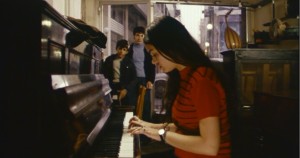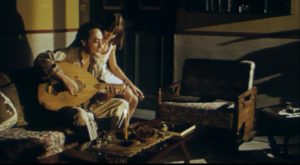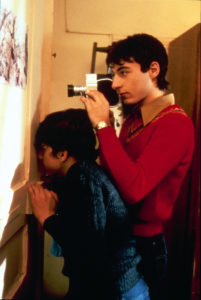Directed by Ziad Doueiri (1998)
Part of Safar: The Festival of Popular Arab Cinema and the Arab Film Festival and Culture at the Cornerhouse, Manchester, UK.
Poignant and emotionally charged, this coming-of-age drama, set in the Lebanese capital of Beirut paints the war torn city in 1975 through its civil bloodshed in deep shades of blood, tears and married in with love and laughter.
Writer and director Ziad Doueiri invites us unapologetically into the lives of a young Lebanese Muslim, Tarek, alongside his parents and best friend Omar. Rami Doueiri, (Ziad’s younger brother) who plays the teenage Tarek, the only son of parents who dote on him, takes us on his journey that shows the clashes of Muslim and Christian rebels, as well as the joining of the two within closer society itself. At home, his number one complaint is his attendance to a French school in Beirut during French occupation. This French school, no less, gathers its students to praise La France, the country that saved them and now educated them. This source of strife for Tarek brings comic relief to the larger crisis to explode into his life soon after.
Beirut becomes a divided city, quite literally with partition walls, and rebels on both sides guarding who enters and exits each side of the city. The West held by Muslims, and East by Christians.
Yet despite this, neither Tarek nor his friends are inclined to play it safe or take no for an answer. Over and over they attempt ways in which to access the other side of Beirut, dodging bombs and entering brothels (to the boys delight and wedded confusion), whilst also portraying typical teenage angst, lust and youthful hope. Their city of Beirut, is neither divided or conquered to them: they are from Beirut, not West or East.
“If someone asks you your religion, tell them you are Lebanese, and then send them to me!”
The film constructively shows Muslim and Christian relationships on a much more human level; as society continues its everyday life selling, buying and living. There is no difference between the Lebanese Muslim and the Lebanese Christian. Tarek personifies this with his friendship with May, their new Christian neighbour who has fled from Baalbek to West Beirut. Though religious conflict may not interfere with their status, May’s crucifix necklace becomes a talking point when approaching boarders in an attempt to cross to the other side. No Muslim or Christian is safe, and each must choose his side.
What haunts you long after you’ve seen West Beirut is the odd mixture of beauty and sadness that seems to be etched on each character’s face. Though, as with present day, the Lebanese people are a people proud of their history, their struggles and their ability to still have a good time despite all of this.
Doueiri fiercely hits home and makes it almost impossible for an audience not empathise with the most simple human emotions of sadness and loss towards the end of the film. He reminds the viewer that even the strongest of characters, in between their adventure on the grounds of war, are not immune to love and loss.
West Beirut, though a film based on 70′s Lebanon, eerily echoes the stories of the Middle East in present day. A chilling watch that drags you from emotion to emotion: a teenage rampage amidst civil war.
To book your tickets to see West Beirut on Wednesday 24th September at 20:10, click here.
The review was first published on Voix Magazine, and can be viewed here.
Naila Missous Kadry is a writer with an interest in Algeria, North Africa and the Middle East. She is also translator of Arabic, French and English. Find her at @N_MissousKadry





